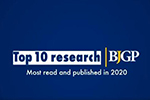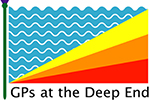News
Read all the latest news stories from the Clinical Effectiveness Group.
 Professor Rohini Mathur is celebrated in Women in Data ‘Top Twenty in Data and Tech’
Professor Rohini Mathur is celebrated in Women in Data ‘Top Twenty in Data and Tech’
27 March 2025
Rohini Mathur, Professor of Health Data Science at CEG, has been selected for the ‘Top Twenty in Data and Tech’, an annual initiative by Women in Data that celebrates inspirational, trailblazing and dedicated women.
 Half of families with children in North East London are living in overcrowded households
Half of families with children in North East London are living in overcrowded households
23 January 2025
Data scientists at CEG used novel methods to estimate inequalities in household overcrowding in North East London. In some areas of the region, over 70% of families have less than 16.6m2 per person, which is little more than a parking space.
 Dr John Ford: Taking 'Living Evidence Maps' to Evidence Week in Parliament
Dr John Ford: Taking 'Living Evidence Maps' to Evidence Week in Parliament
21 January 2025
Dr John Ford is a Senior Clinical Lecturer in Health Equity at CEG. This week, he will join Evidence Week in Parliament to demonstrate how ‘Living Evidence Maps’ can help policy makers find the high-impact ideas within large bodies of evidence.
 CEG partnership with NHS North East London is protecting an additional 1,100 children from measles every year
CEG partnership with NHS North East London is protecting an additional 1,100 children from measles every year
5 December 2024
In 2022, CEG launched a programme in North East London to make it simpler for GP practices to call children for the right vaccination at the right time. An evaluation of the programme, published in Vaccine, found that the proportion of children receiving their first measles, mumps and rubella (MMR) vaccination on time increased by 4.1% (77.7% to 81.8%) as a result. This equates to 92 additional children being protected every month, or more than 1,100 children a year.
 CEG researchers present at the Society for Social Medicine & Population Health 68th Annual Scientific meeting in Glasgow
CEG researchers present at the Society for Social Medicine & Population Health 68th Annual Scientific meeting in Glasgow
4 September 2024
Researchers from CEG’s Household Health, Child Health and Health Inequalities teams will deliver five oral presentations and three posters throughout the conference from 4-6 September.
 Covid-19 had a significant impact on blood pressure recording, but not on blood pressure control
Covid-19 had a significant impact on blood pressure recording, but not on blood pressure control
13 August 2024
An analysis of GP records for people with hypertension reveals that the pandemic had a major effect on whether or not their blood pressure was recorded, but only a modest effect on whether or not it was controlled.
An international team from Queen Mary University of London, Chiang Mai University, the Ministry of Public Health in Thailand, and the London School of Hygiene & Tropical Medicine has been awarded a £2.2 million grant to pilot an intervention to empower doctors in Thailand to improve outcomes for their patients.
 Children living in deprived areas are three times more likely to need dental extractions in hospital
Children living in deprived areas are three times more likely to need dental extractions in hospital
16 July 2024
Our research has found that children living in areas with high levels of deprivation are three times more likely to have severe tooth decay that requires a dental extraction in hospital, compared with children living in more affluent areas. The findings highlight an urgent need for equitable access to preventive dentistry.
 GP Patient Survey analysis lays bare stark regional inequalities
GP Patient Survey analysis lays bare stark regional inequalities
11 July 2024
Experts from our Health Equity Evidence Centre analysed data from the 2024 GP Patient Survey to see what it reveals about socio-economic inequalities in primary care.
CEG data scientists have published a fast, standardised method to help health researchers group occupants of the same household at any point in time.
CEG’s Dr Harriet Larvin and Professor Jianhua Wu have won the William J. Gies Award, given for the best paper published in the Journal of Dental Research during the preceding year. The award is presented by the International Association for Dental, Oral, and Craniofacial Research (IADR) and American Association for Dental, Oral, and Craniofacial Research (AADOCR).
 School-age girls with obesity are more likely to experience joint and muscle pain
School-age girls with obesity are more likely to experience joint and muscle pain
13 March 2024
Girls with obesity are more likely to experience pain in their bones, joints, muscles, ligaments or tendons compared with children with a healthy weight, according to CEG research. The same did not apply to boys.
 HSJ Awards 2023 - winners!
HSJ Awards 2023 - winners!
17 November 2023
A collaborative programme to prevent heart attacks and strokes in north east London has won Medicines, Pharmacy and Prescribing Initiative of the Year at the HSJ Awards 2023. The winners were announced at a ceremony on 16 November.
 ‘Research to support renewal, recovery and resilience’ – Rohini Mathur gives keynote speech at the ADRUK annual conference
‘Research to support renewal, recovery and resilience’ – Rohini Mathur gives keynote speech at the ADRUK annual conference
14 November 2023
The Administrative Data Research UK (ADRUK) annual conference will take place in Birmingham on 14-16 November, with the theme ‘Public data for resilience and inclusion’. The event brings together researchers, data scientists and civil servants from across the UK, to share insights and methodologies that use routinely-collected data for public benefit.
 QOF results 2022-23: North East London is among the best in England for all cardiovascular metrics
QOF results 2022-23: North East London is among the best in England for all cardiovascular metrics
27 September 2023
Latest results of the Quality and Outcomes Framework (QOF) show North East London Integrated Care System is among the best regions in England for all cardiovascular indicators and in the top 10 for many other clinical metrics. The region has achieved this with the smallest number of exclusions (Personalised Care Adjustments) in England.
 CEG presents four major work programmes to national GP teams at the annual EMIS conference in London
CEG presents four major work programmes to national GP teams at the annual EMIS conference in London
13 September 2023
Facilitators and GPs from Queen Mary's Clinical Effectiveness Group (CEG) will present four major work programmes to delegates at the EMIS National User Group Annual Conference, taking place in London on 13-15 September.
 A strong post-pandemic recovery: North East London is best in England for key areas of cardiovascular disease prevention and management
A strong post-pandemic recovery: North East London is best in England for key areas of cardiovascular disease prevention and management
29 August 2023
National data released by CVD Prevent shows NHS North East London is once again among the top performing regions in England for key metrics relating to the prevention and management of cardiovascular diseases.
 Half as many AF patients dying of heart attacks and strokes
Half as many AF patients dying of heart attacks and strokes
25 August 2023
New research finds patients living with atrial fibrillation - one of the UK’s most common heart rhythm conditions - are 50% less likely to die from a heart attack or stroke than they were at the start of the millennium, but there are significant health inequalities between richest and poorest.
 CEG collaboration awarded £710k for a ground-breaking data linkage project that will enable research into household health
CEG collaboration awarded £710k for a ground-breaking data linkage project that will enable research into household health
23 August 2023
With ADR UK funding, the ‘Healthy Households’ collaboration will develop a de-identified, research-ready dataset linking health data, housing data and other administrative data for the populations of England, Scotland and Wales. This will enable new methods for characterising households by social, economic, environmental, educational and health factors to better understand the wider determinants of health.
 Programme preventing heart attacks and strokes shortlisted for HSJ Awards 2023
Programme preventing heart attacks and strokes shortlisted for HSJ Awards 2023
14 August 2023
A collaborative programme to prevent heart attacks and strokes in North East London has been shortlisted for Medicines, Pharmacy and Prescribing Initiative of the Year at the HSJ Awards 2023. The team developed a novel pathway to identify people at risk of heart attack and stroke, ensure they are taking the most suitable medication, treat them closer to home without the need for a hospital referral, and improve access to new therapies.
 New research highlights inequities in blood pressure control
New research highlights inequities in blood pressure control
7 August 2023
A study of adults diagnosed with persistent high blood pressure (hypertension) has found that people who are younger or of Black ethnicity are less likely to have their blood pressure successfully controlled. This puts them at increased risk of heart attack and stroke.
People living in more affluent areas of the UK live almost ten years longer than people in deprived areas1. Housing conditions, money, social isolation and understanding of health information all play a part by significantly impacting our opportunities to be healthy. CEG is working with NHS North East London to enable GP practices to understand which of their patients are affected by these ‘wider determinants of health’. This will give healthcare professionals a broader understanding of an individual’s needs and enable them to deliver better care.
 CEG at the SAPC Annual Scientific Meeting
CEG at the SAPC Annual Scientific Meeting
10 July 2023
Three academic GPs from CEG will present their work at the Society for Academic Primary Care (SAPC) Annual Scientific Meeting, taking place in Brighton on 18-20 July.
 Initiative to prevent strokes in east London wins first place in AF Association Healthcare Pioneers Report 2023
Initiative to prevent strokes in east London wins first place in AF Association Healthcare Pioneers Report 2023
18 June 2023
An initiative led by Barts Health NHS Trust, with CEG, UCL Partners and east London clinicians, is featured as the first-place winner in the AF Association Healthcare Pioneers Report 2023. The report highlights innovative approaches to detecting, protecting, correcting and perfecting atrial fibrillation management.
 New evidence supports sex-specific strategies to prevent heart attack and stroke
New evidence supports sex-specific strategies to prevent heart attack and stroke
15 June 2023
An observational study led by a student of CEG’s Health Data in Practice doctoral training programme has found that the influence of risk factors for heart attack and stroke vary significantly between women and men.
 Join us at The King’s Fund event: ‘Accelerating progress on cardiovascular disease’
Join us at The King’s Fund event: ‘Accelerating progress on cardiovascular disease’
6 June 2023
CEG's Dr John Robson and Dr Stuart Rison are among the speakers and panelists at a forthcoming in-person event hosted by The King’s Fund. ‘Accelerating progress on cardiovascular disease’ will bring together leaders and experts from across the NHS and its partners, to discuss ways of reducing heart disease in the population and improving early detection, management and treatment of heart disease and its risk factors.
 CEG at GeoPlace annual conference 2023
CEG at GeoPlace annual conference 2023
9 May 2023
Dr Gill Harper, honorary post-doctoral research fellow in health data science, will present the ASSIGN algorithm to delegates at the GeoPlace annual conference on 10 May.
 Is a Government programme to tackle childhood obesity doing more harm than good?
Is a Government programme to tackle childhood obesity doing more harm than good?
9 February 2023
Research from Queen Mary University of London is the first to focus on the experiences of parents and their children who were categorised as ‘overweight’ and ‘very overweight’ by England’s National Child Measurement Programme (NCMP), an intervention designed to tackle childhood obesity. The results suggest that the current programme may be at risk of harming the children it aims to help.
 Fahmida Akthar shortlisted in Cambridge Spark Data Awards
Fahmida Akthar shortlisted in Cambridge Spark Data Awards
7 February 2023
We’re proud to announce that our Data and Communications Assistant, Fahmida Akthar, has been shortlisted for ‘Data Citizen Apprentice of the Year’ at the Cambridge Spark Data Awards 2023. Her work with CEG’s facilitation team supports GP practices with curated data to inform patient care, report practice achievements and address health inequalities.
 Comment in The Lancet: How do we collect good-quality data on race and ethnicity and address the trust gap?
Comment in The Lancet: How do we collect good-quality data on race and ethnicity and address the trust gap?
9 December 2022
Rohini Mathur and international co-authors write that high-quality data on race and ethnicity are “pivotal in redressing the historical under representation of diverse populations in clinical research and ensuring that algorithms underpinning patient care do not perpetuate bias and inequalities”. The article is an invited comment as part of The Lancet Series on racism, xenophobia, discrimination, and health.
 Action needed to tackle neighbourhood ‘hotspots’ where fewer than 60% of children receive first MMR vaccine on time
Action needed to tackle neighbourhood ‘hotspots’ where fewer than 60% of children receive first MMR vaccine on time
2 December 2022
There has been an increase in neighbourhoods in north east London where fewer than 60% of children receive their first MMR vaccine on time following the pandemic, according to research from the Clinical Effectiveness Group at Queen Mary University of London. The study, published today in BMJ Open, found that only 75% of children are receiving the first dose of the MMR vaccine on time, compared to the 95% needed to prevent outbreaks of measles, a highly infectious disease. The poorest neighbourhoods were most affected, raising concerns about growing health inequalities after the pandemic.
 CEG's 'Clinical Effectiveness' approach featured in new cardiovascular disease report by The King's Fund
CEG's 'Clinical Effectiveness' approach featured in new cardiovascular disease report by The King's Fund
11 November 2022
CEG's work with the NHS in North East London is featured as a case study in a new report by The King’s Fund: Cardiovascular disease in England: Supporting leaders to take actions. The report calls for “urgent action by government, national and local leaders to tackle the large and unequal burden of disease and mortality associated with cardiovascular disease - much of which is potentially preventable through timely, evidence-based public health measures and health care.”
 CEG Cancer Toolkit will support GPs to reduce avoidable delays in cancer diagnosis and care
CEG Cancer Toolkit will support GPs to reduce avoidable delays in cancer diagnosis and care
1 November 2022
The Clinical Effectiveness Group (CEG) has launched a Cancer Toolkit to GP practices across North East London. It includes a clinical template, patient record searches, a data dashboard and a new Cancer Diagnosis Audit Tool. Together, the resources will support GP practice teams to address inequalities and deliver timely cancer diagnosis and care for everyone who needs it.
 Initiative to improve equal access to diabetes treatment wins Quality in Care Diabetes Award
Initiative to improve equal access to diabetes treatment wins Quality in Care Diabetes Award
14 October 2022
Using CEG’s software tools, GP practices across North East London reviewed the care of hundreds of people with type 1 diabetes to ensure they can access the treatment they need, regardless of gender, ethnicity, language, disability or wealth. The region has since seen an 11% increase in the numbers of patients re-engaging with diabetes specialists at local hospitals and community care centres. On 13 October, it was announced that the initiative won a Quality in Care (QiC) Diabetes Award, under the category: Patient Care Pathway, Secondary and Community.
 CEG-supported health service for young people in Tower Hamlets is shortlisted for London Youth Awards 2022
CEG-supported health service for young people in Tower Hamlets is shortlisted for London Youth Awards 2022
13 October 2022
Health Spot – a collaboration between Spotlight, Tower Hamlets GP Care Group, the Clinical Effectiveness Group (CEG), Docklands Outreach and Safe East – has been shortlisted for the Partnership Working Award at the London Youth Awards 2022. The Health Spot service offers friendly, confidential medical appointments with a doctor who is experienced in supporting young people with health needs.
 CEG presents three innovative projects at the International Population Data Linkage Network conference in Edinburgh
CEG presents three innovative projects at the International Population Data Linkage Network conference in Edinburgh
20 September 2022
Linking anonymised GP records to other datasets (for example, on housing or collected by schools) can reveal important insight into how circumstances interact and influence our health. At the International Population Data Linkage Network conference, between 7-9 September, CEG researchers presented three projects that use innovative data linkage methods to address important research questions that have broad implications for policy.
 Two thirds of atrial fibrillation patients on dual-antithrombotic therapy are prescribed the medication for too long, increasing the risk of internal bleeding
Two thirds of atrial fibrillation patients on dual-antithrombotic therapy are prescribed the medication for too long, increasing the risk of internal bleeding
15 September 2022
An observational study of people with the heart condition atrial fibrillation, published by a student of Queen Mary’s Wellcome Trust-funded PhD programme: Health Data in Practice, has found that almost 2 in 3 (65.9%) patients on dual-antithrombotic therapy (DAT) receive the treatment for more than 12 months. This is considered too long and puts the patient at increased risk of bleeding complications.
 CEG provides swift response to data needs for the Polio Booster Campaign
CEG provides swift response to data needs for the Polio Booster Campaign
25 August 2022
Queen Mary’s Clinical Effectiveness Group (CEG) is collaborating with the NHS in North East London, providing intelligence to inform the logistics of the immunisation campaign and software tools to ease the burden for GPs.
The software tool ‘APL-Imms’ was developed by Queen Mary’s Clinical Effectiveness Group (CEG) to help GP practices immunise more children against preventable illness. The timing of the updated tool will help GPs to protect more children against polio, which has recently been detected in north east London sewage.
 Seeing the same GP is good for your health, but only half of patients are able to do so
Seeing the same GP is good for your health, but only half of patients are able to do so
29 June 2022
Researchers at Queen Mary University of London found that only half of patients regularly see the same GP, despite increasing evidence that continuity of care between GPs and patients leads to better outcomes.
People who benefit the most from seeing the same GP are those with long-term health conditions and people who visit a practice frequently. With continuity of care in decline, these patients could be disproportionately affected, leading to suboptimal care and important issues being missed. The researchers are calling on policymakers to measure continuity of care as a marker of GP practice quality, with incentives to encourage improvement.
 Collaboration to reduce strokes in east London is recognised with HSJ Patient Safety Award nomination
Collaboration to reduce strokes in east London is recognised with HSJ Patient Safety Award nomination
20 June 2022
A collaborative project by Barts Health NHS Trust, CEG, UCLPartners and east London clinicians has been shortlisted for Best use of integrated care and partnership working in patient safety at the HSJ Patient Safety Awards 2022. The team worked to reduce strokes in people with the heart condition atrial fibrillation (AF) by increasing the use of life-saving anticoagulant medications. In the first 12 months, anticoagulant prescription rates in people with AF in the region reached 95% – well above the national target of 90%.
Researchers at Queen Mary University of London have found that more than a quarter of asthma patients are still over-using inhalers intended for rapid relief of symptoms. Overuse of these inhalers is linked to an increased risk of hospital admissions and severe asthma attacks. They also found that prescribing varies between GP practices, with some overprescribing rescue inhalers to 6% of their asthma patients and some to as many as 60%.
 Type 2 diabetes sub-groups could guide future treatment approaches in primary care
Type 2 diabetes sub-groups could guide future treatment approaches in primary care
26 May 2022
Researchers in the Clinical Effectiveness Group (CEG) have identified sub-groups of type 2 diabetes, which could inform a personalised approach to managing the condition. The study, published in the British Journal of General Practice, uses data from the multi-ethnic population of east London and analyses standard metrics that are routinely recorded by GPs.
 CEG address-matching algorithm selected by HDR UK Impact Committee
CEG address-matching algorithm selected by HDR UK Impact Committee
26 April 2022
The paper ‘Evaluation of the ASSIGN open-source deterministic address-matching algorithm for allocating Unique Property Reference Numbers to general practitioner-recorded patient addresses’ has been selected by the HDR UK Impact Committee as having significant impact and clearly demonstrating the value of uniting the UK’s health data to make discoveries that improve people’s lives. The committee meets monthly to select research outputs put forward by research directors, researchers, and other members of the HDR UK community.
 Testing for underlying causes of high blood pressure in young adults can be life-lengthening and should be routine
Testing for underlying causes of high blood pressure in young adults can be life-lengthening and should be routine
28 March 2022
In an article published in the BMJ: ‘Investigating hypertension in younger patients’, Doctors Stuart Rison, Chris Carvalho and John Robson of Queen Mary’s Clinical Effectiveness Group (CEG) argue that GPs should be mindful of the possibility of an underlying condition when treating patients with hypertension who are under 40 years old and investigate this as appropriate.
By Carol Dezateux, Professor of Clinical Epidemiology and Health Data Science at the Clinical Effectiveness Group (CEG), Queen Mary University of London
 Optimising treatments for high blood pressure and cardiovascular disease is life-saving and cost effective
Optimising treatments for high blood pressure and cardiovascular disease is life-saving and cost effective
14 January 2022
A recent study shows that optimising medicines for high blood pressure and cardiovascular disease patients living in East London could reduce lifetime hospital costs and prevent cardiovascular events such as heart attacks and strokes.
 CEG receives funding to tackle falling pre-school immunisation rates as part of London Health Data Strategy
CEG receives funding to tackle falling pre-school immunisation rates as part of London Health Data Strategy
14 December 2021
Four projects tackling some of London’s key health challenges have been awarded a total of £1 million to demonstrate how the use of data at scale can improve health outcomes, supporting delivery of the London Health Data Strategy. The Clinical Effectiveness Group at Queen Mary University of London leads one of the four successful projects: a primary care quality improvement system designed to address falling rates of routine childhood immunisations.
 CEG researchers develop algorithm to study how health is impacted by where we live
CEG researchers develop algorithm to study how health is impacted by where we live
8 December 2021
Researchers from Queen Mary’s Clinical Effectiveness Group have developed an address-matching algorithm to link patient health records to geospatial information.
 HPV vaccine cuts cervical cancer cases by almost 90% – but one in ten girls still haven’t been vaccinated
HPV vaccine cuts cervical cancer cases by almost 90% – but one in ten girls still haven’t been vaccinated
4 November 2021
Professor Carol Dezateux and Nicola Firman from Queen Mary's Clinical Effectiveness Group (CEG) have co-written a piece for The Conversation on a recent study published in The Lancet, which found that the HPV vaccine cuts cervical cancer cases by nearly 90 per cent, and their research on uptake.
 Applications open for our PhD Health Data in Practice
Applications open for our PhD Health Data in Practice
27 October 2021
Our Wellcome Trust funded doctoral training programme, Health Data in Practice, is open for applications until Monday 10 January. We aim to develop future scientific leaders who are able to apply interdisciplinary perspectives to research and realise the potential of innovations in health data research for the benefit of patients, the public, health care systems and society.
 CEG receives new funding to research inequalities in childhood immunisation
CEG receives new funding to research inequalities in childhood immunisation
15 October 2021
Dr Milena Marszalek, NIHR Academic Clinical Fellow in General Practice and member of Queen Mary University of London’s Clinical Effectiveness Group (CEG), has been awarded £7,000 from Barts Charity to investigate the impacts of ethnicity and deprivation on timely uptake of the Measles, Mumps and Rubella (MMR) vaccine in children.
 CEG uses patient data to prevent 200 heart attacks and strokes in east London
CEG uses patient data to prevent 200 heart attacks and strokes in east London
11 October 2021
The Clinical Effectiveness Group (CEG) at Queen Mary University of London is supporting a programme to prevent 200 heart attacks and strokes in the London borough of Redbridge over five years. The team have built a data-driven tool for GP practices, to increase prescribing of statin medication and identify patients for a new ground-breaking drug that reduces cholesterol.
 CEG’s data searches will support proactive care for a third of adults in England with long-term conditions
CEG’s data searches will support proactive care for a third of adults in England with long-term conditions
7 October 2021
CEG’s risk stratification searches form an integral part of the Proactive Care Frameworks developed by UCL Partners. These resources have now been adopted into a national NHS programme ‘Proactive Care @home’, to be used in 12 Integrated Care Systems across England. This covers around one third of the adult population.
 Clinical Effectiveness Group awarded funding for new Primary Care Research Fellowships
Clinical Effectiveness Group awarded funding for new Primary Care Research Fellowships
27 September 2021
Queen Mary University of London has received funding for three fellowships in primary care as part of our membership in the National Institute of Health Research (NIHR) School for Primary Care Research (SPCR). Two of the fellows – Dr Meredith Hawking and Dr Chris Carvalho – are members of the university’s Clinical Effectiveness Group (CEG) who use primary care data to improve population health in north east London.
 Young women not in mainstream education are missing out on vital protection against cervical cancer
Young women not in mainstream education are missing out on vital protection against cervical cancer
24 September 2021
HPV vaccination prevents several serious diseases caused by the Human papillomavirus, including cervical cancer. The UK has been vaccinating young women, aged 12-13 years, against HPV since 2008 through a school-based programme. Uptake is high – around 84% of young women are fully immunised through the programme*, but new research published in Vaccine reveals some groups are less likely to be vaccinated than others.
 NHS Health Checks are not helping people who need them most
NHS Health Checks are not helping people who need them most
14 June 2021
According to a seven-year study of more than three million people, led by researchers in the Clinical Effectiveness Group, only 8 per cent of people at greater risk of heart disease who would benefit from taking statins, were prescribed them.
 Researchers test an algorithm that could predict heart attacks in young people
Researchers test an algorithm that could predict heart attacks in young people
20 May 2021
Press release: Researchers in the Clinical Effectiveness Group at Queen Mary University of London have tested an algorithm on 700,000 patient records in east London, to find out if the data routinely collected by GPs can reveal cases of Familial Hypercholesterolemia – a leading cause of heart attack in young people.
 CEG research makes BJGP's top ten most read papers of 2020
CEG research makes BJGP's top ten most read papers of 2020
25 January 2021
Update: Research by CEG made the top ten list for the most read articles in the British Journal of General Practice in 2020. We used data from GP records across east London to demonstrate there were three times as many suspected Covid-19 cases presented to GPs during the peak of the first wave than shown in official Covid-19 test results, and twice the risk for ethnic minorities. Read the full research paper here, or find out more about our work on Covid inequalities in our online case study.
 £6.7 million investment to ‘harness’ the power of NHS patient data and develop targeted care
£6.7 million investment to ‘harness’ the power of NHS patient data and develop targeted care
18 December 2020
Barts Life Sciences – a partnership between Queen Mary University of London and Barts Health NHS Trust – has been awarded £6.7m by Barts Charity to research new ways to improve the prevention, diagnosis and treatment of a variety of diseases. The diseases to be studied include Covid-19, cancer, heart disease and diabetes, which affect many in the East London population.
 UCLP Proactive Care Frameworks
UCLP Proactive Care Frameworks
25 September 2020
CEG is collaborating with UCL Partners on their Proactive Care Frameworks. The programme will help primary care practices deliver proactive care to patients with long-term conditions post-Covid, where as much as possible needs to be delivered remotely.
Supporting primary care through the pandemic
14 September 2020
Update: Covid-19 has created an urgent need to deliver routine care more efficiently, particularly for patients with long-term conditions. There has been an increased need to prioritise at-risk groups, enable virtual reviews and self-management, and assess needs that can be met by a variety of professionals such as healthcare assistants, pharmacists and nurses. Here’s how we are supporting these activities and where to find our resources.
 Covid-19 data from GPs shows triple the number of suspected cases and twice the risk for ethnic minorities
Covid-19 data from GPs shows triple the number of suspected cases and twice the risk for ethnic minorities
8 September 2020
Press release: There were three times as many suspected Covid-19 cases presented to GPs during the peak of the pandemic than shown in official Covid-19 test results, according to research led by the Clinical Effectiveness Group at Queen Mary University of London.
CEG is working remotely
16 March 2020
In light of Covid-19, the CEG team will be working from home from Thursday 19 March.
 Conference: The Scottish Deep End Project, University of Glasgow
Conference: The Scottish Deep End Project, University of Glasgow
14 February 2019
Dr John Robson presented at The Scottish Deep End Project: The Exceptional Potential of General Practice.
CEG Community Kidney Service featured in the NHS Long Term Plan
7 January 2019
Update: The NHS Long Term Plan was launched today. It is an ambitious vision to improve NHS care with an increased focus on prevention and digital solutions. The Community Kidney Service, developed jointly by CEG, three east London Clinical Commissioning Groups and St. Bartholomew's Hospital is featured as a case study in the opening chapter 'A new service model for the 21st century'.
 International collaboration led by CEG awarded £2.2 million to trial a ‘Learning Health System’ approach to disease management in Thailand
International collaboration led by CEG awarded £2.2 million to trial a ‘Learning Health System’ approach to disease management in Thailand
 New standardised method for grouping patient records into ‘households’ will enable more effective research into the factors that shape our health
New standardised method for grouping patient records into ‘households’ will enable more effective research into the factors that shape our health
 AI-enabled research into patterns of multimorbidity in people with gum disease wins prestigious William J. Gies Award for best paper
AI-enabled research into patterns of multimorbidity in people with gum disease wins prestigious William J. Gies Award for best paper
 More than a quarter of people with asthma are still over-using rescue inhalers – putting them at increased risk of severe attacks and hospitalisation
More than a quarter of people with asthma are still over-using rescue inhalers – putting them at increased risk of severe attacks and hospitalisation
 How CEG’s data scientists and support team are helping GP teams prevent measles outbreaks using software tools on practice patient records
How CEG’s data scientists and support team are helping GP teams prevent measles outbreaks using software tools on practice patient records